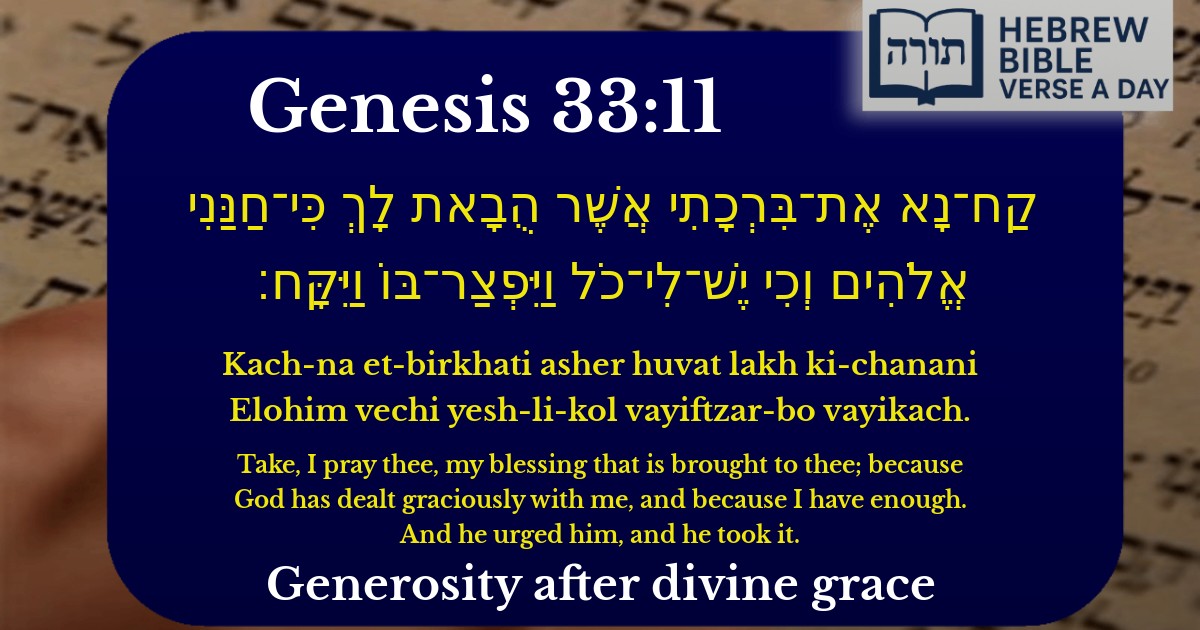Frequently Asked Questions
Q: What does Genesis 33:11 mean when it says 'Take my blessing'?
A: In Genesis 33:11, Jacob is offering gifts to his brother Esau as a gesture of reconciliation after their long separation. The term 'blessing' (בִּרְכָתִי) refers to the material gifts Jacob brought. Rashi explains that Jacob wanted to show Esau that he was not coming to take anything from him, but rather to give, demonstrating his goodwill and desire for peace.
Q: Why did Jacob insist that Esau take his gifts in Genesis 33:11?
A: Jacob insisted because he wanted to ensure that Esau accepted his gesture of peace wholeheartedly. The verse says 'he urged him,' showing Jacob's persistence. According to the Midrash, Jacob understood the importance of sincere reconciliation and wanted to remove any lingering resentment between them. By accepting the gifts, Esau showed that he had truly forgiven Jacob.
Q: What does Genesis 33:11 teach us about gratitude to God?
A: Jacob acknowledges God's kindness by saying, 'because God has dealt graciously with me.' This teaches us the importance of recognizing and thanking Hashem for our blessings. The Rambam (Hilchot Berachot) emphasizes that gratitude is a fundamental Jewish value, and Jacob sets an example by attributing his success to divine grace.
Q: How does Jacob's statement 'I have enough' (יֶשׁ־לִי־כֹל) apply to our lives today?
A: Jacob's declaration reflects true contentment with what Hashem has given him, a key principle in Jewish thought. The Talmud (Pirkei Avot 4:1) teaches, 'Who is rich? One who is happy with his portion.' Jacob's attitude reminds us to focus on gratitude rather than constantly seeking more, aligning with the Torah's emphasis on spiritual satisfaction over materialism.
Q: Why is the reconciliation between Jacob and Esau important in the Torah?
A: Their reconciliation demonstrates the value of peace and repairing relationships, a core Torah ideal. The Talmud (Sanhedrin 6b) teaches that pursuing peace is a great mitzvah. Jacob's efforts to make amends with Esau, despite their past conflicts, set an example for resolving disputes with sincerity and humility, as emphasized in Jewish tradition.


Context of the Verse
This verse (Genesis 33:11) appears in the narrative of Yaakov (Jacob) reuniting with his brother Eisav (Esau) after many years of separation. Yaakov offers Eisav gifts, referred to as "ברכה" (blessing), as a gesture of reconciliation. The verse captures Yaakov's insistence that Eisav accept his gift, emphasizing that Hashem has graciously provided for him, leaving him with abundant resources.
Yaakov's Use of "ברכה" (Blessing)
Rashi explains that Yaakov refers to his gifts as a "ברכה" (blessing) because they were originally intended to appease Eisav and avert his anger. The term "ברכה" here carries a dual meaning: material gifts and spiritual goodwill. The Midrash (Bereishit Rabbah 78:11) notes that Yaakov's phrasing reflects his humility—he does not boast of his wealth but attributes it entirely to Hashem's grace.
Attribution to Divine Kindness
Yaakov states, "כי חנני אלוקים" ("because God has dealt graciously with me"). Ramban (Nachmanides) highlights that Yaakov acknowledges that his prosperity is not due to his own efforts alone but stems from Hashem's kindness. This aligns with the broader Torah principle of recognizing divine providence in one's success (Devarim 8:18). The phrase "ויש לי כל" ("and I have enough") further underscores Yaakov's contentment with what Hashem has granted him, as noted by the Sforno.
Yaakov's Insistence and Eisav's Acceptance
The verse concludes with "ויפצר בו ויקח" ("And he urged him, and he took it"). The Talmud (Megillah 16b) derives from this that one should persist in offering kindness even if initially refused. The Kli Yakar adds that Yaakov's insistence demonstrates his sincerity in seeking reconciliation, ensuring Eisav would not later resent him for withholding generosity.
Key Lessons from the Verse